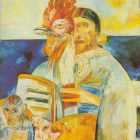Oberon 1986Edinburgh International Festival
Read more about the opera Oberon
The Edinburgh Festival's Director, Frank Dunlop, was definitely a man of the theatre, and many Festivalls had enjoyed the fruits of his labour since the sixties. He had not previously directed an opera, but the highlight in 1986 was clearly his staging of Weber's Oberon, the pantomime elements of which suited him to a tee. The Maly Theatre from Leningrad were the first Russian opera company to visit the Festival, bringing three productions, at a time when it was quite unthinkable that the Kirov and Bolshoi would be almost frequent visitors within a few years. Two fitted the Festival's Tchaikovsky theme. The Toronto Symphony brought a Stravinsky double-bill, simply staged in the Usher Hall, where The Soldier's Taleand Oedipus Rex came over well. A second theme of the Festival was the Scottish Enlightenment and the works of Walter Scott and James Macpherson ('Ossian'), for which the SNO and conductor Neeme Järvi assembled a fascinating evening that ended with a concert performance of Mehul's Ossian opera Uthal.
Non-operatic events included notable performances by Simon Rattle and the CBSO of Dream of Gerontius and Mahler's Resurrection Symphony.
In 1985, Scottish Opera had staged a rewriting of the much-mocked libretto of Weber's last opera. This well-intentioned enterprise turned out to be a sad miscalculation, since Anthony Burgess's new version tended to make people unfamiliar with the original wonder whether Planchê's version could be as bad as that. Frank Dunlop, the Festival's director, seems to have had the same idea, and the following year he staged the Planché version to generally excellent effect.
For this, the Usher Hall's open platform was adapted with a sloping ring stage that provided an acting space across the front, another at the back of the choirstalls, and sloping ramps linking them at either side. The orchestra was located in the hole in the middle. It did not look great, but it worked effectively, with all the singers and actors contributing to an enjoyable show.
Frank Dunlop himself directed with flair and imagination. He had little or no previous operatic experience, but had directed several Festival productions in previous years, including work in the awkward spaces of the Assembly Hall and Haymarket Ice Rink (and in the latter he had had a particular success in 1971 with his Young Vic company in the premiere production of Joseph and the Amazing Technicolor Dreamcoat and The Comedy of Errors, played in repertoire). He was therefore experienced in dealing with the spoken dialogue and the pantomime elements that can cause problems for opera specialists.
Seiji Ozawa had rarely conducted in Edinburgh and was unknown as an opera conductor, but he took to the setup without a hitch and conducted a lovely performance. Three actors, Gail Rolfe, Peter Birch and Robert Oates played the spoken roles effectively, and of the singers, Benjamin Luxon, an experienced Papageno, had the audience in his hand from the start. The Reiza of Elizabeth Connell was beautifully sung, particularly in her superb performance of the notorious 'Ocean, thou mighty monster'. Philip Langridge was excellent as Oberon, but should really have been cast as Huon, since the heldentenor Paul Frey sang well, but passed the coloratura flights of his big aria to Langridge - a solution which resulted in pleasanter sounds than if he'd sung the whole piece himself. Casting Puck as a treble instead of a mezzo was perhaps the only other element of the evening about which there was doubt.
Performance Cast
- Oberon King of the Fairies
- Titania Queen of the Fairies
- Puck Oberon's servant
- Charlemagne King of the Franks
- Charlemagne's son
- Sir Huon of Bordeaux Duke of Guienne
- Sherasmin Sir Huon's squire
- Reiza daughter of Haroun el Raschid
- Fatima Reiza's attendant
- Haroun el Raschid Caliph of Baghdad
- Babekan a Saracen prince
- Abdallah a Corsair
- Mermaid
- Almanzor Emir of Tunis
- Solo voice

